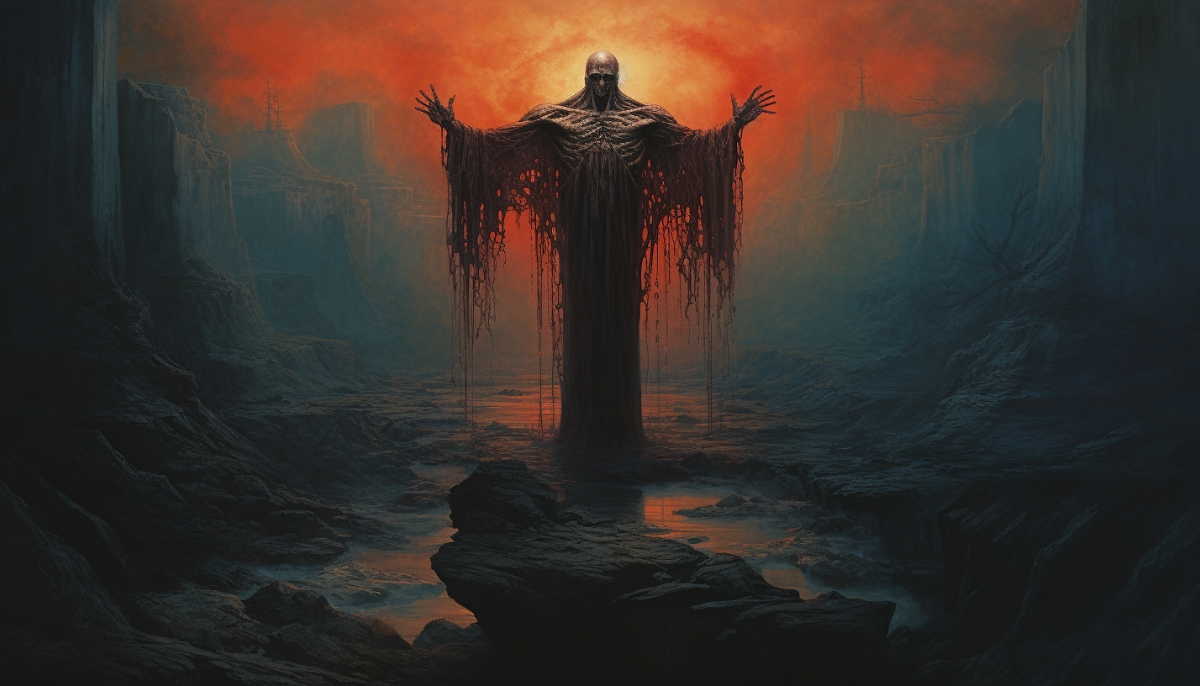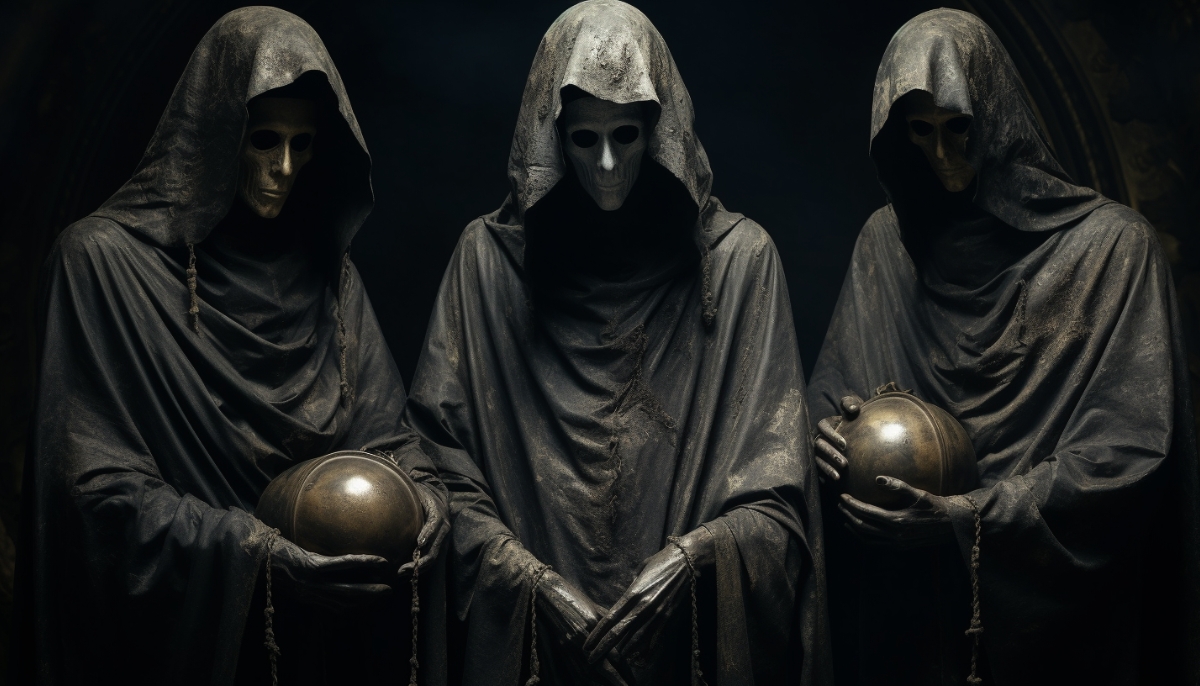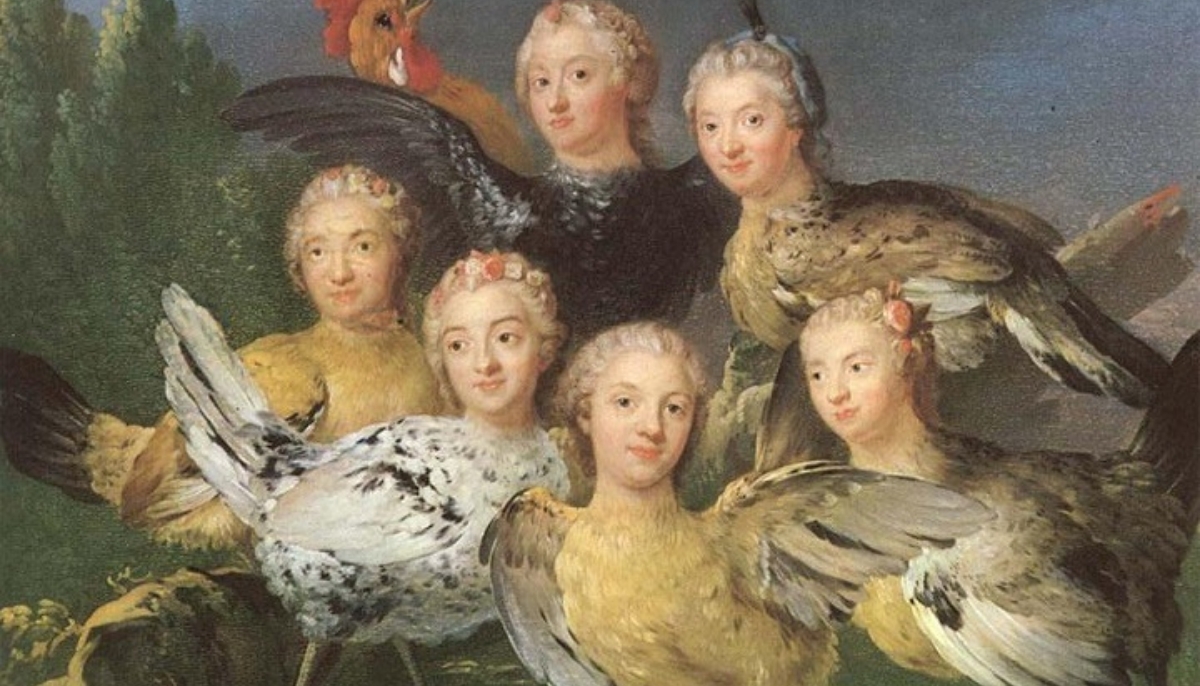Welcome to our curated selection of the best Greek mythology fantasy books, where ancient legends are reborn through the magic of storytelling.
For those eager to know our top pick, we’ve placed our number one choice at the beginning of the article, ensuring you don’t miss the crown jewel of Greek mythology retellings.
Join us as we journey through these imaginative reimaginings, where the wonders of ancient Greece are just a page-turn away.
This article is one in a series on the best Greek mythology books.
The Best Greek Mythology Fantasy Book – Lore, Alexandra Bracken
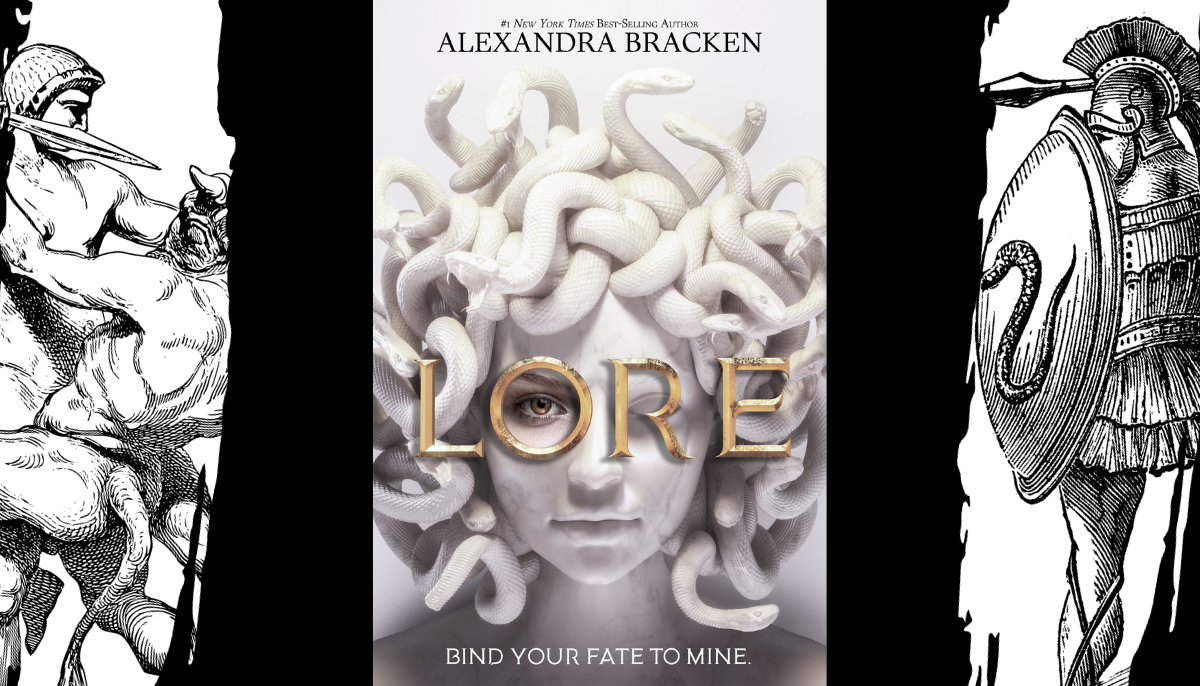
Our top choice for Greek mythology-inspired fantasy is Alexandra Bracken’s “Lore.” This gripping novel combines the intensity of “The Hunger Games” with the rich tapestry of Greek myths.
Set against the backdrop of modern-day New York City, the story centers around the Agon, a brutal hunt occurring every seven years where nine Greek gods, punished for a past rebellion, are forced to walk the earth as mortals. They become the prey, hunted by descendants of ancient bloodlines eager to seize their divine power and immortality.
The protagonist, Lore Perseous, once fled the cruelty of this world after her family’s murder by a rival line, vowing to leave the hunt and its promises of glory behind. However, her resolve is tested as the new Agon looms over New York City. Lore is drawn back into the fray by two unexpected figures: her presumed-dead childhood friend Castor and a gravely injured Athena, one of the last original gods.
Bracken’s Lore stands out for its thrilling and inventive narrative, blending the lore of Greek mythology with the high stakes of a survival game. The novel explores themes of revenge, alliance, and the high cost of power, all while offering a fresh take on familiar mythological figures. Lore’s journey, filled with action and tough decisions, keeps the reader engrossed until the end.
The Ten Thousand, Paul Kearney
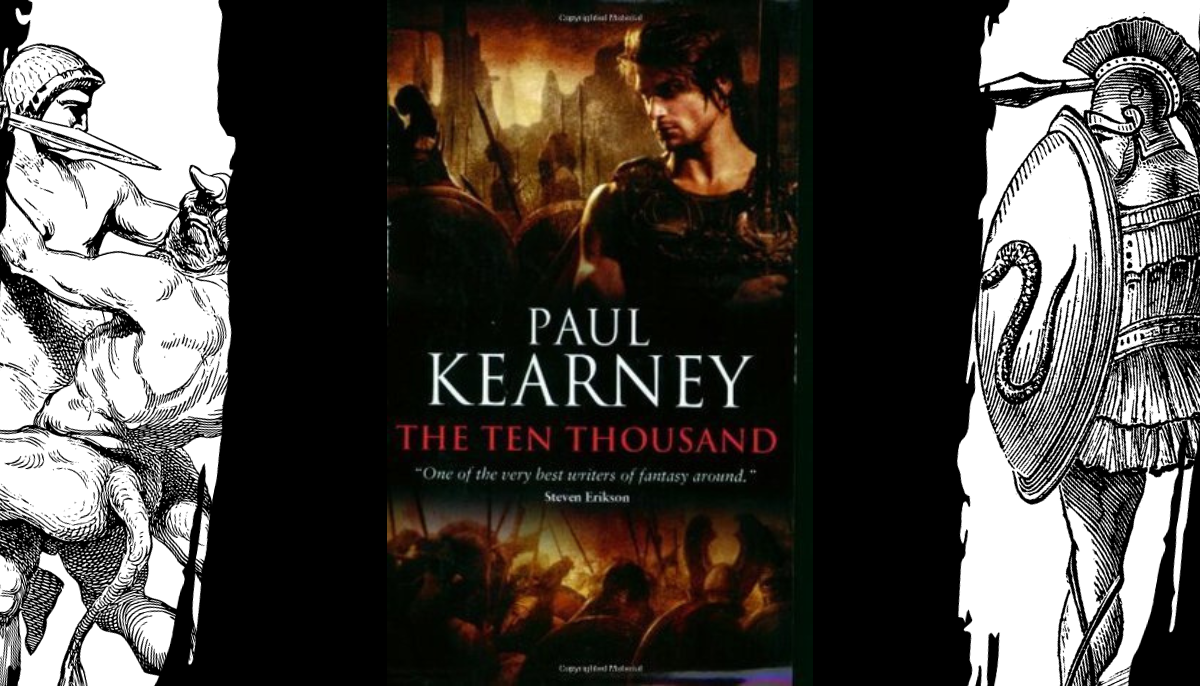
Paul Kearney’s ‘The Ten Thousand’ emerges as a gripping entry into Greek mythology-inspired fantasy, rivaling the works of George R.R. Martin and Steven Erikson. This novel, deeply rooted in the narrative style of Xenophon’s Anabasis, transports readers into a vividly imagined world brimming with conflict, strategy, and survival.
Set in the fantasy world of Kuf, The Ten Thousand introduces the Macht, a fierce, somewhat enigmatic warrior race renowned for their combat prowess. Kearney expertly crafts a backdrop where these legendary fighters are hired for an audacious mission to overthrow the Great King of the Asurian Empire. In this realm, multiple races coexist under a seemingly invincible ruler. The tale unfolds with the Great King’s brother plotting to seize the throne, igniting a sprawling campaign of war and power struggles.
The novel distinguishes itself with its raw and realistic depiction of warfare. Unlike typical fantasy fare filled with whimsical magic and mythical creatures, Kearney’s narrative delves into the grit and grime of military life. Readers are plunged into the midst of battle, experiencing the visceral intensity of close combat and the brutal realities that soldiers face. This accurate portrayal of war lends the book a unique authenticity, often missing in more fantastical settings.
Kearney’s world-building is meticulous, painting a complex political and social landscape. The Empire of Kuf, with its golden-skinned rulers and intricate caste system, is a character in its own right, shaping the story’s direction and the destinies of its characters. The Macht, with their fearsome reputation and barbaric valor, are a fascinating focal point, offering a fresh perspective on the warrior hero archetype.
Characters in The Ten Thousand are richly developed, each bringing their nuances to the story. From battle-hardened commanders to ambitious royals, the cast is diverse and dynamic. Kearney’s skillful character development ensures that even amid epic battle scenes, personal stories of honor, ambition, and sacrifice shine through.
The narrative’s pace is relentless, with a sense of urgency that keeps readers hooked from start to finish. Kearney’s writing style is both eloquent and accessible, balancing detailed descriptions with swift action. The story’s conclusion, while somewhat anticlimactic, is fittingly nuanced, leaving readers with a sense of completion yet yearning for more.
Soldier of the Mist, Gene Wolfe
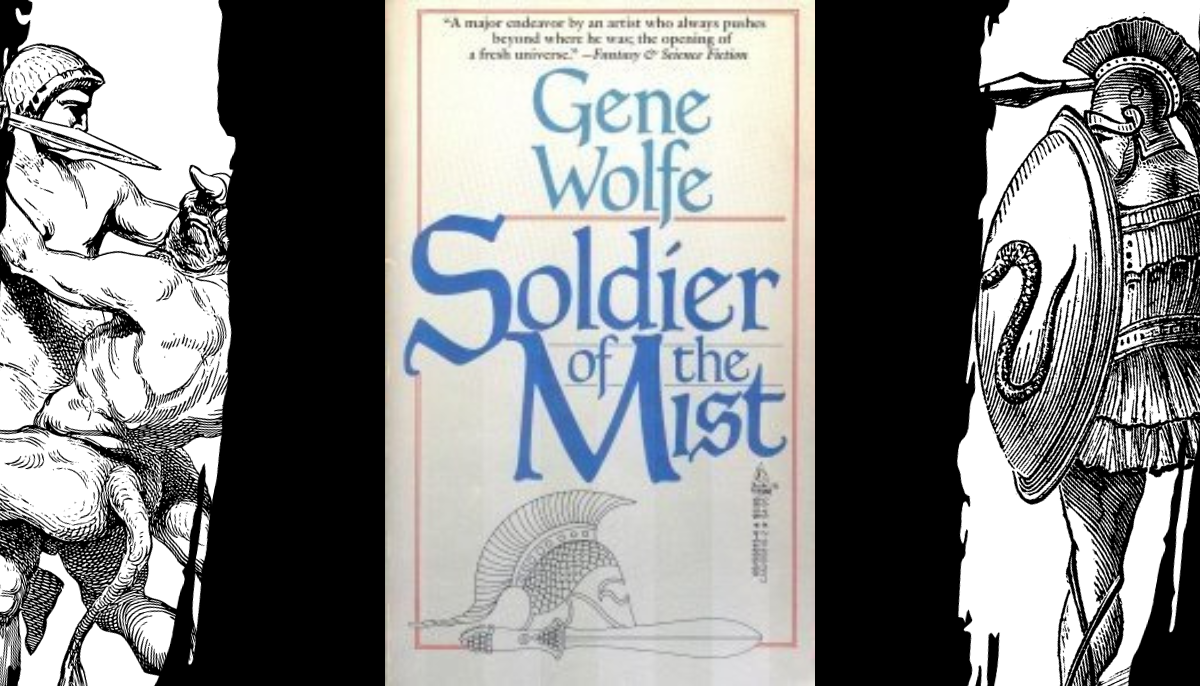
Gene Wolfe’s “Soldier of the Mist” offers a captivating dive into the historical world of Greece in 479 B.C., blending fantasy with a classic tale. The protagonist, Latro, a mercenary soldier, suffers a head injury, resulting in a unique condition where he can neither remember his past nor retain short-term memories, living each day anew. Intriguingly, this injury also allows him to see and communicate with supernatural beings, including gods and goddesses, adding a fascinating layer to his journey.
Wolfe’s narrative is rich and immersive, presenting a Greece where gods walk the Earth and influence human affairs. Latro’s perspective, as he reads his daily recordings to piece together his existence, creates a compelling, puzzle-like story that challenges and intrigues the reader. Wolfe masterfully incorporates the supernatural, portraying deities with motives beyond human understanding yet deeply connected to the human world.
The novel cleverly plays with historical elements, using literal translations for places and names to add a fresh perspective to the well-known setting. Wolfe’s portrayal of the gods is particularly noteworthy, capturing their otherworldly nature while retaining their ties to classical mythology.
The story, inspired by Xenophon’s Anabasis, follows Latro’s quest to regain his memory and identity, taking readers across the land of the Hellenes during the Graeco-Persian wars. This setting allows Wolfe to explore ancient Greece from an outsider’s viewpoint, revealing its grandeur and underlying darkness.
Though Wolfe’s style includes familiar themes like unreliable narrators and intricate, layered storytelling, Soldier of the Mist stands out for its unique protagonist and the blend of historical and supernatural elements. The narrative’s depth and complexity make it a rewarding read for those who enjoy historical fantasy and Greek mythology.
The Lightning Thief – Percy Jackson and the Olympians, Rick Riordan
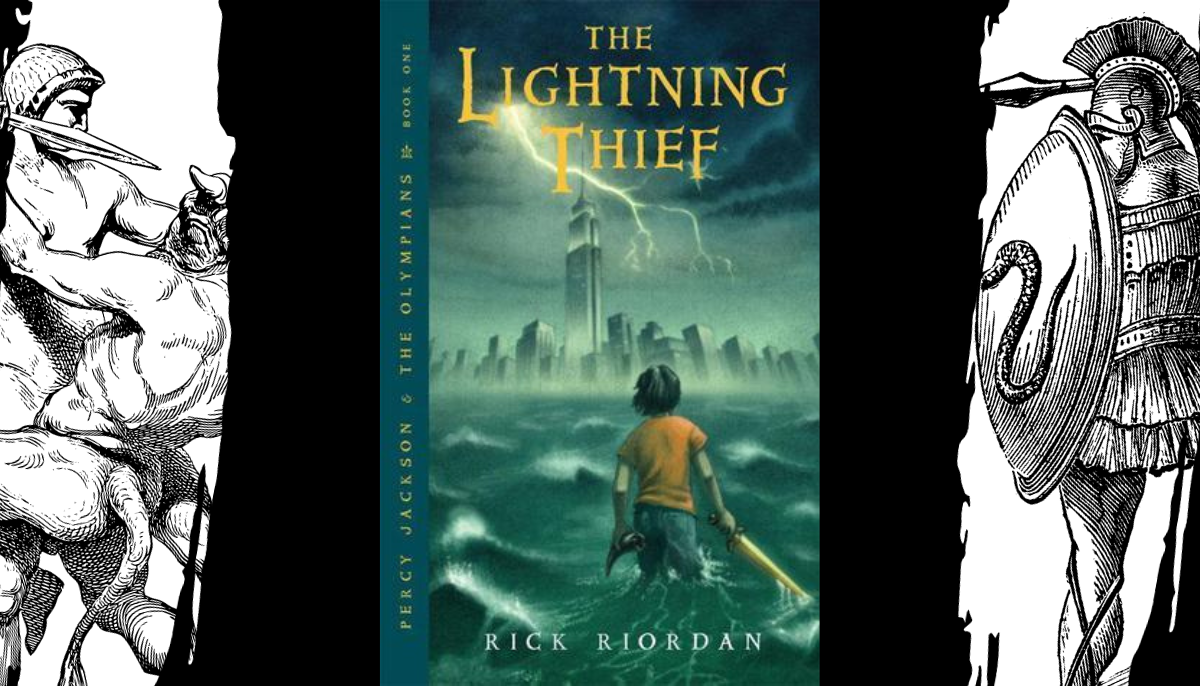
Rick Riordan’s “The Lightning Thief” is the first book in the renowned “Percy Jackson & the Olympians” series, a cornerstone in YA literature that masterfully blends Greek mythology with modern adventure. The story follows Percy Jackson, a seemingly average boy whose life spirals into the extraordinary when he discovers he’s a demigod, the son of Poseidon. Sent to Camp Half-Blood, a haven for young demigods, Percy embarks on a thrilling quest to prevent a war among the gods.
Riordan’s novel is lauded for its creative integration of ancient myths into a contemporary setting, making the stories of Greek gods and heroes accessible and appealing to a young audience. With humor and wit, he crafts an entertaining and educational narrative, offering a fresh take on classic mythology.
Percy Jackson is an endearing protagonist whose struggles with ADHD and dyslexia make him relatable to young readers. The supporting characters, including Annabeth and Grover, contribute depth and humor to the story, enhancing the reading experience. Their journey is about action and adventure, self-discovery, friendship, and understanding one’s identity.
The Lightning Thief is a captivating introduction to Greek mythology, packaged in a fast-paced, engaging story perfect for young adults. Its blend of mythological elements with real-world issues makes it a standout novel, encouraging young readers to explore the rich world of ancient myths.
The Lost Hero – The Heroes of Olympus, Rick Riordan
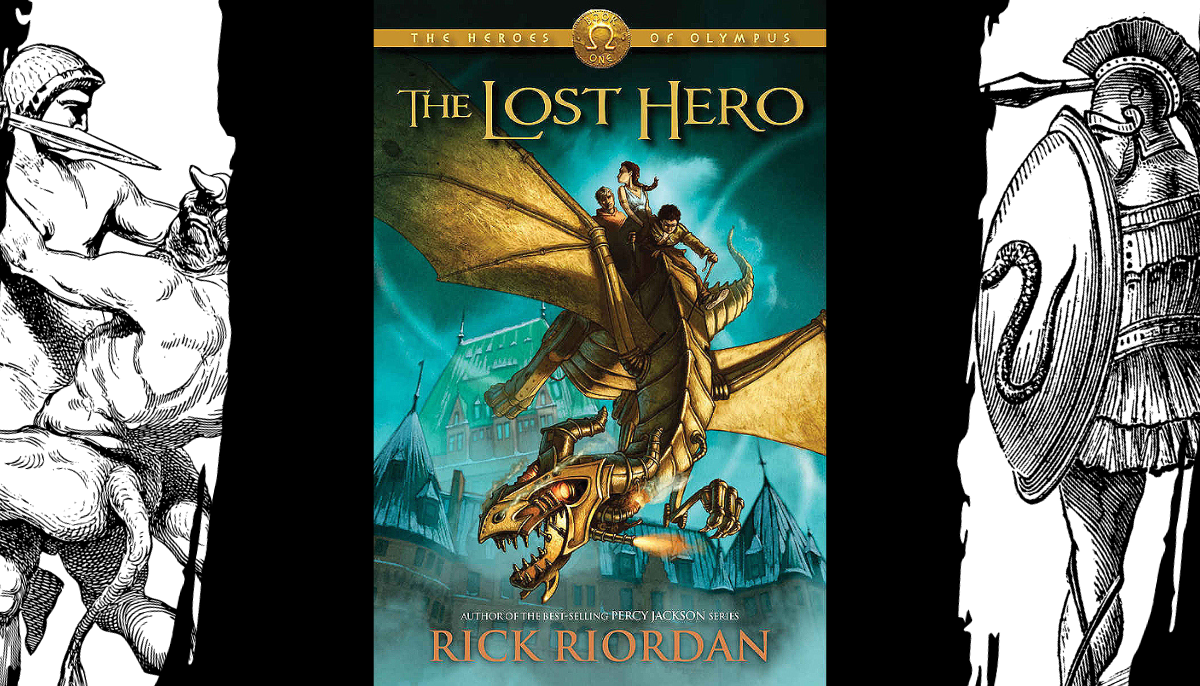
Rick Riordan’s “The Lost Hero,” the first book in “The Heroes of Olympus” series, is a dynamic extension of the world established in “Percy Jackson & the Olympians.” This novel introduces readers to new protagonists: Jason, a boy with no memory of his past; Piper, whose father’s mysterious disappearance propels her into a quest; and Leo, a mechanical wizard with a humorous spirit. The trio finds themselves at Camp Half-Blood, where they learn they are demigods and embark on a perilous quest related to an ancient prophecy.
The Lost Hero stands out for its seamless blend of Roman and Greek mythology, expanding the scope of Riordan’s universe. The novel is applauded for its well-crafted plot, engaging character development, and the introduction of fresh mythological elements. The story is told through multiple perspectives, adding depth and variety to the narrative.
Riordan’s signature humor and fast-paced storytelling are evident, making complex myths accessible and entertaining for young readers. He skillfully weaves modern issues into the fabric of ancient tales, creating relatable characters who grapple with identity, loyalty, and friendship.
The Lost Hero is not just a continuation of a beloved universe; it’s an expansion that invites new and old fans alike to explore a richly imagined world where myths come alive.
Circe, Madeline Miller
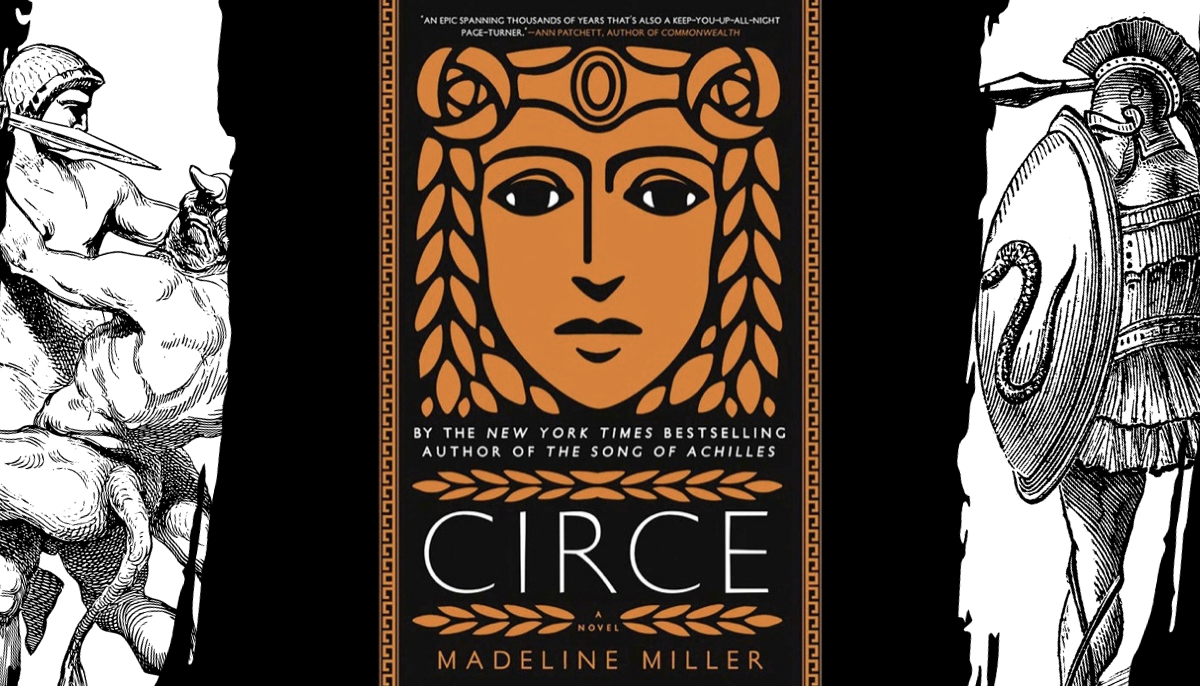
“Circe” by Madeline Miller is a breathtakingly beautiful retelling of Greek mythology from the perspective of one of its most fascinating yet often overlooked characters. Born in the house of Helios, god of the sun, Circe is an enigmatic figure who, despite lacking the powerful allure of her divine relatives, discovers her true strength in witchcraft. This newfound power leads her to a life filled with transformations, challenges, and profound relationships.
Banished to a deserted island by Zeus, Circe’s story unfolds in a narrative that’s as much about self-discovery as it is about magic. Her journey brings her into contact with famous mythological figures, including the Minotaur, Daedalus and Icarus, and the hero Odysseus. Each encounter enriches her experience, adding layers to her character that are both compelling and deeply human.
What sets Circe apart is how it transforms the traditional narrative of Greek mythology. Instead of focusing on the heroic deeds of gods and men, it delves into the life of a woman who stands resilient despite facing the wrath of both gods and mortals. Circe’s story is a testament to the strength of character, the power of resilience, and the complexities of love and desire.
Miller’s portrayal of Circe is remarkable for its depth and relatability. While a goddess, Circe experiences emotions and struggles that resonate with readers. Her journey is marked by joy and sorrow, revealing a character as multifaceted as she is enduring.
For fans of Greek mythology, Circe offers a fresh and captivating perspective. Miller’s narrative style is lush and evocative, bringing to life the world of gods and mortals with vivid detail. But beyond its mythological roots, this book speaks to universal themes of identity, power, and the nature of love.
The Song of Achilles, Madeline Miller
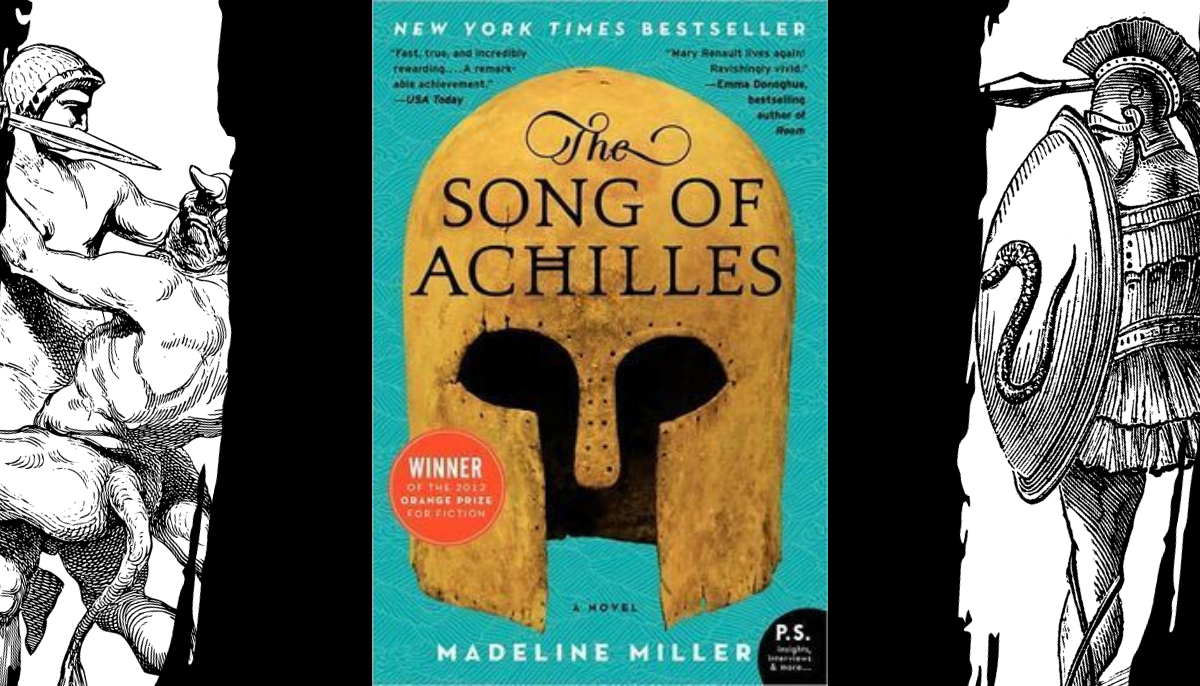
Madeline Miller’s “The Song of Achilles” is a beautifully crafted retelling of the ancient Greek tale of Achilles and Patroclus. Set against the backdrop of the Trojan War, this novel brings a fresh and profoundly human perspective to a classic myth. The story is narrated by Patroclus, an exiled young prince who forms an intense and profound bond with Achilles, the greatest warrior of his age.
Miller’s novel is acclaimed for its lyrical prose and ability to infuse a well-known story with new depth and emotion. The relationship between Achilles and Patroclus is rendered with sensitivity and depth, exploring themes of love, destiny, and the human condition. The author delves into the complexities of their bond, portraying it as a powerful and transformative force that transcends time constraints.
The book is also notable for its detailed and authentic portrayal of the ancient world, from the palaces of Phthia to the battlefields of Troy. Miller’s meticulous research is evident in every aspect of the story, vividly bringing the settings and characters of ancient Greece to life.
The Song of Achilles has been praised for its unique blend of mythological grandeur and human intimacy. It’s a tale of gods and heroes and a profoundly moving story about two individuals navigating the turbulent waters of love and war. This novel is a testament to the enduring power of ancient stories and their ability to resonate with modern readers.
The Just City, Jo Walton
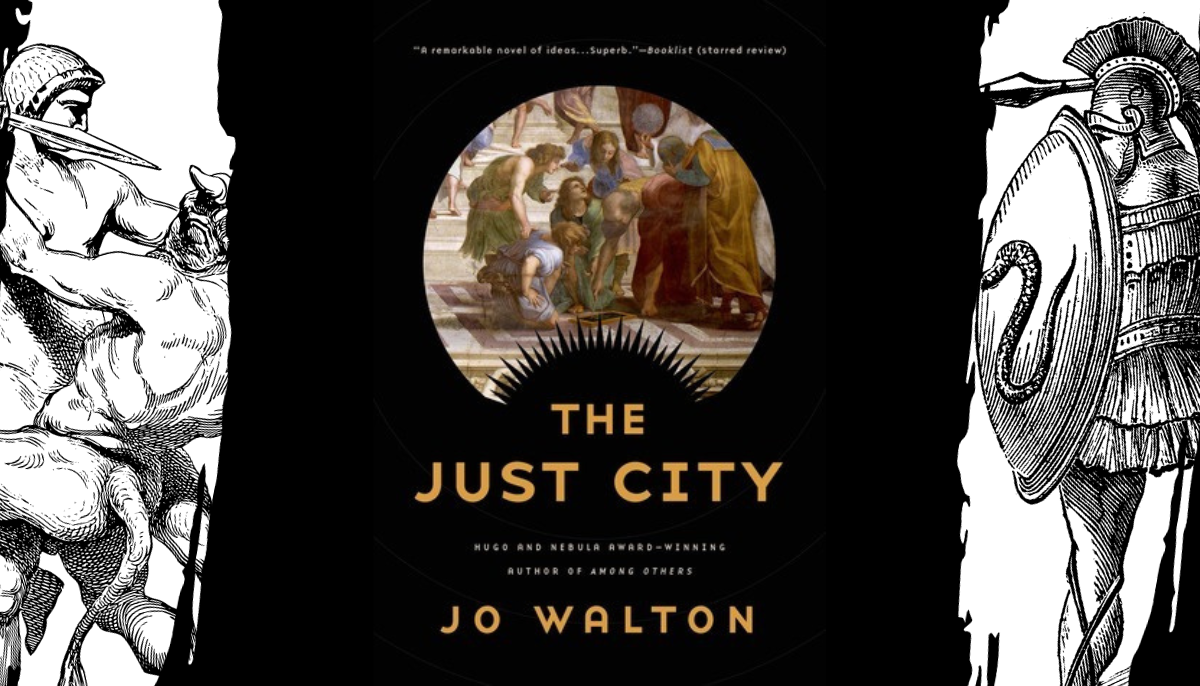
Jo Walton’s “The Just City” is a thought-provoking blend of science fiction and fantasy, set in an experimental society formed by the Greek goddess Pallas Athene. This unique narrative transports characters from various historical periods, along with robots from the far future to a Mediterranean island in the past to create Plato’s Republic.
The story unfolds through the eyes of three diverse characters: Maia, a Victorian woman yearning for intellectual freedom; Simmea, a bright and eager student; and Pytheas, who is actually the god Apollo in human form, seeking to understand human volition.
Walton masterfully explores philosophical and ethical questions, weaving together elements of time travel, Greek mythology, and classical philosophy. Including gods like Athene and Apollo adds a fantastical dimension. At the same time, their interactions and interventions in human affairs offer a deeper look at divine capriciousness and the complexities of free will.
The novel shines in its portrayal of the Just City, a place teeming with intellectual debates and challenges, as it strives to realize Plato’s vision. The city, powered by electricity and served by potentially sentient robots, becomes a character, representing both the potential and pitfalls of utopian experiments.
Apollo’s human journey is a highlight, presenting a god trying to comprehend human complexities. His perspective, alongside that of Maia and Simmea, provides a rich exploration of growth, learning, and the pursuit of justice. Walton’s narrative also addresses the inherent flaws in human nature and the contradictions within the Greek gods, adding layers of realism to this fantastical setup.
Despite its ambitious premise, The Just City delves into the failings of its utopian experiment, reflecting on the unchangeable aspects of human nature and societal structures. The book’s thoughtfulness and depth make it more than just an imaginative retelling; it’s a novel that encourages deep reflection on humanity and philosophy.
Ariadne, Jennifer Saint
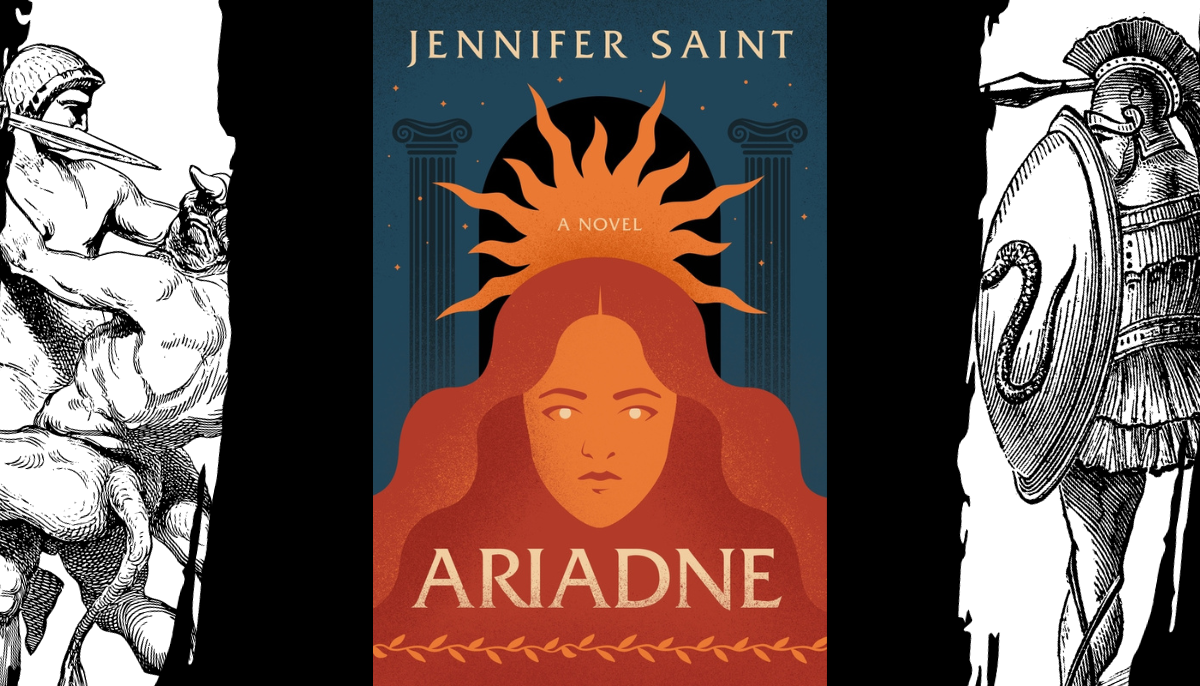
Jennifer Saint’s “Ariadne” is a captivating retelling of Greek mythology, focusing on the life of Princess Ariadne of Crete beyond her well-known involvement with the Minotaur. The novel expands Ariadne’s story past the familiar labyrinth tale, exploring her entire life, including her relationships with Theseus and Dionysus.
Saint’s writing is beautiful and evocative. The narrative style pays homage to traditional Greek oral storytelling, enriching the novel with a classical feel. One of the book’s strengths is its fresh perspective on Theseus, contrasting with his character’s more commonly known aspects.
What truly sets Ariadne apart is its focus on the often-overlooked women of Greek mythology. Saint gives Ariadne and her sister Phaedra a voice, delving into their roles in a world dominated by men and gods. This perspective offers insightful commentary on the broader role of women in myth and history.
Fans of “Circe” and Greek mythology retellings will find Ariadne a compelling and worthwhile read. Saint’s novel is a must for those who enjoy seeing classic tales reimagined with depth and fresh insight, especially from the viewpoints of characters traditionally left in the shadows.
The Silence of the Girls, Pat Barker
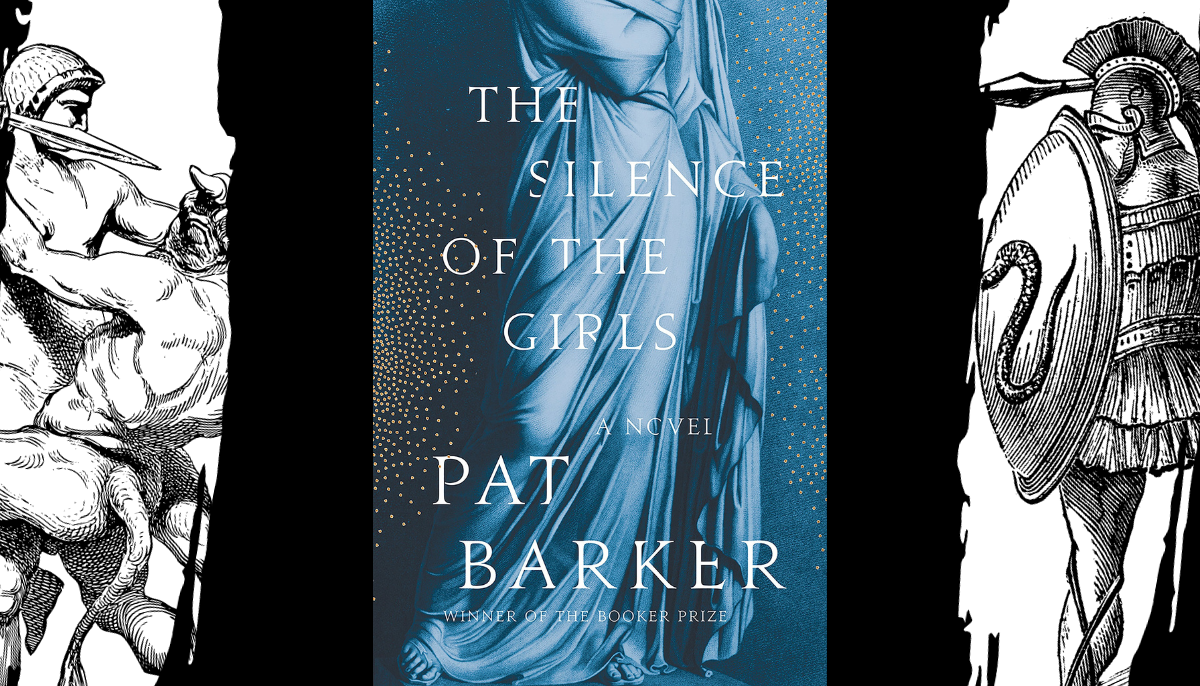
Pat Barker’s “The Silence of the Girls” is a highly recommended read for fans of Greek mythology. This novel offers a unique retelling of the Trojan War, shifting the focus from heroes’ glory to women’s often-overlooked experiences. Told through the perspective of Briseis, who transitions from a queen to Achilles’s concubine, the story unveils the untold narratives of women amidst the epic conflict.
Barker’s compelling portrayal of Achilles adds depth to this classic tale, but Briseis’s journey of resilience and survival truly captivates the reader. While the story primarily unfolds from Briseis’s viewpoint, Barker’s writing artfully maintains the essence of Homer’s epic, lending a modern feel to this ancient classic.
The novel stands out for its eloquent prose, historical accuracy, and nuanced character portrayals. Barker’s reimagining of this legendary tale brings the unseen and unheard to life, making it a must-read for those interested in Greek mythology and historical fiction. Barker’s work is a magnificent contribution to the genre, offering fresh insights and revelations into familiar mythological characters and stories.


